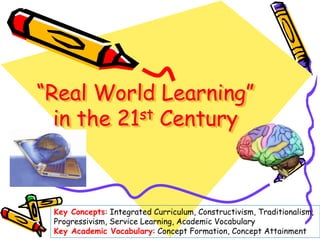Topic 4B: Real World Learning
•Descargar como PPTX, PDF•
1 recomendación•746 vistas
Denunciar
Compartir
Denunciar
Compartir

Recomendados
Developing Sustainable Leadership: Changing MBA Curriculums to Breed Responsi...

Developing Sustainable Leadership: Changing MBA Curriculums to Breed Responsi...Cleaner Greener China
The Journey Begins 4 - Enhancing the Student Experience

The Journey Begins 4 - Enhancing the Student ExperienceCentre for Educational Development, University of Bradford
Más contenido relacionado
La actualidad más candente
Developing Sustainable Leadership: Changing MBA Curriculums to Breed Responsi...

Developing Sustainable Leadership: Changing MBA Curriculums to Breed Responsi...Cleaner Greener China
The Journey Begins 4 - Enhancing the Student Experience

The Journey Begins 4 - Enhancing the Student ExperienceCentre for Educational Development, University of Bradford
La actualidad más candente (20)
Developing Sustainable Leadership: Changing MBA Curriculums to Breed Responsi...

Developing Sustainable Leadership: Changing MBA Curriculums to Breed Responsi...
The Journey Begins 4 - Enhancing the Student Experience

The Journey Begins 4 - Enhancing the Student Experience
Ensuring quality and integrity in the delivery of online learning

Ensuring quality and integrity in the delivery of online learning
Academic Innovation and Excellence Committee: 12-6-17 

Academic Innovation and Excellence Committee: 12-6-17
Tenacious transformation: An institutional case study of sense-making in onli...

Tenacious transformation: An institutional case study of sense-making in onli...
An institutional journey of discovery: Finding the online voice

An institutional journey of discovery: Finding the online voice
External Relations and Alumni Engagement Committee: 12-6-17

External Relations and Alumni Engagement Committee: 12-6-17
Destacado
Destacado (18)
Topic 2B: Foundations of Education - Schools of Today

Topic 2B: Foundations of Education - Schools of Today
Topic 6: Teaching Character Education to Middle Years Characters

Topic 6: Teaching Character Education to Middle Years Characters
There and Back Again: An Introduction to Integration and Synthesis

There and Back Again: An Introduction to Integration and Synthesis
Topic 2A: Foundations of Education - Schools of Yesterday

Topic 2A: Foundations of Education - Schools of Yesterday
Topic 11: Game-based Learning and Gamification in the Classroom

Topic 11: Game-based Learning and Gamification in the Classroom
Similar a Topic 4B: Real World Learning
Teaching business ethics: have we missed the financial crisis bus? - Julia Cl...

Teaching business ethics: have we missed the financial crisis bus? - Julia Cl...The Higher Education Academy
Similar a Topic 4B: Real World Learning (20)
Evolving the Loop: How ePortfolios drive a 21st century learning college

Evolving the Loop: How ePortfolios drive a 21st century learning college
Teaching business ethics: have we missed the financial crisis bus? - Julia Cl...

Teaching business ethics: have we missed the financial crisis bus? - Julia Cl...
Applying accredited community-based learning and research into your curriculu...

Applying accredited community-based learning and research into your curriculu...
Applying accredited community-based learning and research into your curriculu...

Applying accredited community-based learning and research into your curriculu...
EcoRise Youth Innovations: Design Studio (curriculum sample)

EcoRise Youth Innovations: Design Studio (curriculum sample)
Alison Winch 'Live Briefs and Employability Agenda'

Alison Winch 'Live Briefs and Employability Agenda'
Más de bgalloway
Más de bgalloway (14)
Topic 8: The Power of Movement, Fun and Collaboration

Topic 8: The Power of Movement, Fun and Collaboration
Topic 7: Brain Compatible Teaching (Part3): Differentiated Instruction

Topic 7: Brain Compatible Teaching (Part3): Differentiated Instruction
Week 3B - Integrated Unit Plan - Entry Event Exemplar

Week 3B - Integrated Unit Plan - Entry Event Exemplar
Week 3: Frameworks for Learning in the 21st Century Classroom

Week 3: Frameworks for Learning in the 21st Century Classroom
Topic 4B: Real World Learning
- 1. “Real World Learning” in the 21st Century Key Concepts: Integrated Curriculum, Constructivism, Traditionalism, Progressivism, Service Learning, Academic Vocabulary Key Academic Vocabulary: Concept Formation, Concept Attainment
- 7. “Real World Learning Skills”
- 8. KEY CONCEPT #5: SERVICE LEARNING
- 10. “Service” or “Service Learning”? – Recycling Programs – Pennies for Paws – “A Better World” Global Projects – Kids Cure for Cancer – MS Read-a-thon – Jump Rope for Heart – Locks for Love Are these examples? Concept Attainment
- 13. DEFINITION: Service learning is a philosophy involving the application of academic skills to solving real-life problems in the community
- 14. Service Learning is characterized by students and teachers making decisions about: – Community issues & needs to be addressed – Areas of the curriculum to be addressed in the project – Roles of participants – Publicity needs Service learning has 4 components: – Preparation – Action – Reflection – Demonstration
- 15. Why Service Learning? – Decrease in school suspensions, dropouts and teenage pregnancy – Positive attitudes towards adults – Gains in self confidence, self-worth, self- esteem & social competence – Classes less boring & more related to life – Decrease in discipline problems – Gain career skills & career exploration knowledge – Positive effects to moral development/character development – More trustworthy, responsible, caring and altruistic – Greater awareness of cultural diversity – More concerned about community and community issues 21ST CENTURY LEARNING
- 17. “Real World Learning” in the 21st Century “Are we preparing kids to write tests for life, or are we preparing FOR the tests of life” ***Art Costa, Habits of Mind